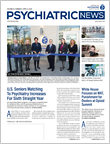Treatment-resistant depression (TRD) costs employers in the United States up to $48 billion each year, according to a study published in the March/April issue of the Journal of Clinical Psychiatry.
The study, by Tony B. Amos, Pharm.D., M.S., of the Janssen Pharmaceutical Companies of Johnson & Johnson and colleagues found that compared with major depressive disorder (MDD), TRD poses a significant direct and indirect cost burden to employers and may be associated with higher rates of “employment status change,” that is, employees whose status changes for such reasons as termination or reduced hours.
Amos and colleagues relied on data contained in a U.S. insurance claims database of more than 19.1 million privately insured individuals covered by 84 Fortune 500 companies in the United States to compare people who had TRD with those who had MDD but were not treatment resistant and people who had not been diagnosed with depression. Costs, health care utilization, and employment status change were compared over two years following the first antidepressant prescription claim.
APA and the APA Foundation have long been involved in a program, through the Center for Workplace Mental Health, that educates employers about the business case for investing in their employees’ mental health and offering enhanced insurance benefits for mental health treatments (see sidebar).
Key findings from the analysis included the following:
•
Health care resource use and costs were roughly double ($17,261) for employees with TRD compared with those with non-TRD depression ($9,790) and quadruple compared with people without depression ($4,782).
•
Health care costs for employees with TRD increased with each treatment failure, from $12,047 a year after two failures to $18,667 after six or more lines of therapy over the two-year study observation period.
•
Employees with TRD were absent approximately 35.8 work days per person a year, which was nearly twice as many days as those with non-TRD depression and six times as many days as those without depression.
•
Employees with TRD were more likely to change employer status over the two-year follow-up. TRD employees were 1.6 times more likely than non-TRD employees and 2.3 times more likely than nondepressed employees to switch to COBRA status during this time.
“Relatively speaking, depression has one of the highest [economic] burdens compared with a lot of other diseases,” study author Neeta Tandon, M.A., senior director of health economics and outcomes research at the Janssen Pharmaceutical Companies of Johnson & Johnson, told Psychiatric News. “If you have this disorder for a long period of time or you go in and out of depressed states, it will impact your work life.”
TRD accounts for $29 billion to $48 billion of the MDD burden a year, which is estimated at $210.5 billion in direct health care and indirect work loss–related costs in this country, wrote Amos and colleagues. They noted that studies have shown that patients with TRD have two to three times greater direct and health care resource utilization and costs than patients with MDD.
“Nearly half of this impact is attributable to direct medical expenses, with the remainder borne in the workplace through absenteeism and presenteeism and in the labor market more generally through changes in the employment status and suicidality,” the authors wrote.
The rationale behind the study, Tandon said, was to bring attention to the fact that TRD is an area that needs new treatments so that employees are not unable to work, missing work, or on long-term disability. “[The study] makes a call for better treatment and more innovations for these patients,” she said. ■
“Direct and Indirect Cost Burden and Change of Employment Status in Treatment-Resistant Depression: A Matched Cohort Study Using a U.S. Commercial Claims Database” can be accessed
here.
